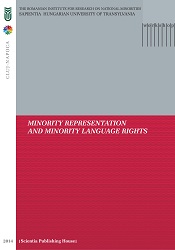The Catalan Regional Autonomy and its Experiences in Central and Eastern Europe
The Catalan Regional Autonomy and its Experiences in Central and Eastern Europe
Author(s): Endre Domonkos
Subject(s): Politics / Political Sciences
Published by: Scientia Kiadó
Summary/Abstract: My research field is the evaluation of the international autonomy models, especially the Catalan regional autonomy and its experiences in the Central and Eastern European region. The term of autonomy is tightly correlated to the decentralization of administrative structures and the principle of subsidiarity because, in every bourgeois state, autonomy can be realized by power-sharing. In this case, the competences of the central government and the local units are fixed by basic rules and constitution. One of the main accomplishments of the 1978 adopted Spanish Constitution was, inter alia, the creation of a democratic political system, which recognized Spain’s multinational characteristics. The Iberian country was divided into seventeen different autonomous communities, which had self-governance. According to the Constitution, the Basques, the Catalans and the Galicians were recognized as historical nationalities within the framework of Spain, providing a wide range of autonomy for them. The Spanish constitutional model could be a very good example because the country has succeeded in joining the European Union without having internal national conflicts. The endeavour of my lecture will be the evaluation of the experiences of the Catalan regional autonomy and its applicability in Central and Eastern Europe. I think that the Spanish constitutional model and the Catalan regional autonomous system have got important relevancies in order to preserve the linguistic, political and historic traditions of the Hungarian national minorities that live in Central and Eastern Europe. In my lecture, I will also focus on the different autonomy concepts elaborated by the Hungarian minority parties, using a multidisciplinary approach, and analyse its main elements.
Book: MINORITY REPRESENTATION AND MINORITY LANGUAGE RIGHTS
- Page Range: 215-239
- Page Count: 25
- Publication Year: 2014
- Language: English
- Content File-PDF

